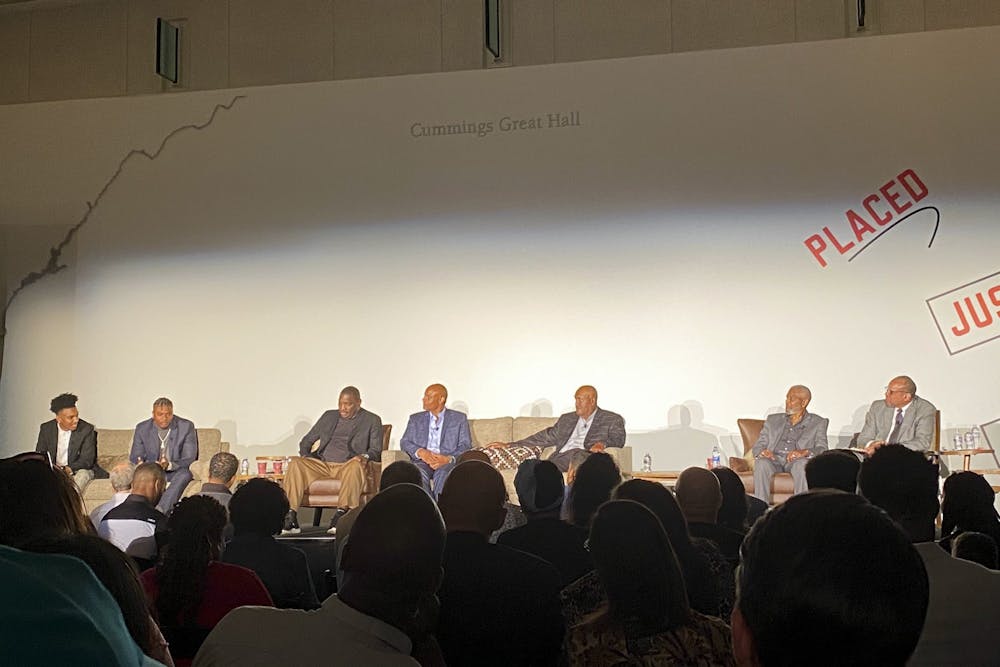Brady. Manning. Favre. Rodgers. The list of iconic quarterbacks in the NFL goes on and on. But now, young, rising stars in the league are redefining what the role means for them and remembering the trek it took to get here.
Moderated by sports writer Bill Rhoden, Black quarterbacks from the past, present and future of football discussed the role and legacy of the Black quarterback at the panel "Black Bodies in Leadership: Journey of the Black Quarterback" at the Phoenix Art Museum Thursday night.
All three eras came together to share their perspectives on the challenges faced as a Black quarterback and how the future looks to be changed by the newest generation. A key point of the panel was to debunk the common criticism that Black quarterbacks can't lead teams.
Rhoden, a visiting professor at ASU, spoke about the initial struggle of Black quarterbacks in the early days of professional football, who were often forced to switch positions or barred from play altogether. That previous notion casts a juxtaposition from the modern era of the NFL where Black quarterbacks like Baltimore Ravens' Lamar Jackson and Houston Texans' Deshaun Watson are some of the league's best.
"My success depended on my preparation because I worked hard and prepared," James "Shack" Harris, the first Black quarterback to start a season opener, said. Harris was also the first Black quarterback to start and win a playoff game.
"And when I arrived to the Rams, they were still asking, 'Can a black play quarterback?' Harris said. "I was on three teams, and they were still asking, 'Can a black play quarterback?'"
The topics at the core of the panel have been at the center of recent discussions concerning the current state — and future — of the NFL.
"In 2019, there were 12 Black quarterbacks who started NFL games, one shy of the watermark reached in five seasons in the early 2000s," wrote Elena Bergeron in The New York Times. "But this season’s quarterbacks started a record 138 games, continuing an upward trend of Black quarterbacks who sustain rather than spot-fill the role for franchises."
Marlin Briscoe, the first Black quarterback to start in a professional game, offered insight into playing in the late 1960s.
"I'm the kind of person who never gives up," he said. "I knew it wasn't gonna be a level playing field. Racism was running rampant in 1968. The more they did to me, the tougher I got. I wasn't going to let them beat me."
Yet, black quarterbacks are still under constant criticism today. Before the 2018 draft, Jackson, a future NFL MVP, was reportedly asked by multiple teams if he would switch to wide receiver.
Jackson's 2019 MVP win followed that of Patrick Mahomes, marking the first time Black quarterbacks were honored with the accolade back-to-back in the league's history.
Briscoe received calls asking for opinions on Jackson's position, and he adamantly rejected the notion that Jackson should switch to wide receiver.
NFL Hall of Famer Warren Moon said he purposely ran slower during the draft process so teams wouldn't tell him to switch positions, adding that, "The position of quarterback did not scare me at all. If anything, it invigorated me."
Former San Francisco 49ers quarterback Colin Kaepernick was brought up often during the panel. Sophomore ASU quarterback Jayden Daniels discussed his admiration for Kaepernick's controversial kneeling to protest police brutality in 2016, saying, "I feel like he was just standing up for his rights, our rights."
Panelists agreed that trailblazers of the past helped pave the way for modern Black quarterbacks to play today.
"We didn't go through half the stuff they went through," Washington Redskins quarterback Dwayne Haskins said. "But they went through that so we could go play."
Doug Williams, the first Black quarterback to play and win a Super Bowl, talked about how playing for the Tampa Bay Buccaneers could be harsh if the team wasn't doing well. Fans did not take kindly to Williams during the team's struggles, and the hatred was often racially motivated.
"If you're black and you're not doing well, that's (tough)," Williams said.
Moon added, "Having to explain that (racist) talk to your son after you're already dejected from a loss is hard."
Daniels recited advice his father gave him for motivation in such circumstances, saying, "'You always gotta be three times better than the white quarterback to be successful.'"
Ultimately, Harris encouraged Haskins and Daniels to rise above the hate and take the chance to make their own legacies as Black quarterbacks.
"It's all preparation – that determines how good you are, how (much) you win and what you accomplish as a quarterback," Harris said. "And that starts tomorrow."
Reach the reporter at cvanligt@asu.edu and follow @Connor_VL on Twitter.
Like The State Press on Facebook and follow @statepress on Twitter.




